OCEAN PLUNDER
Caught in Mauritania and eaten in Japan, the common octopus is being fished out
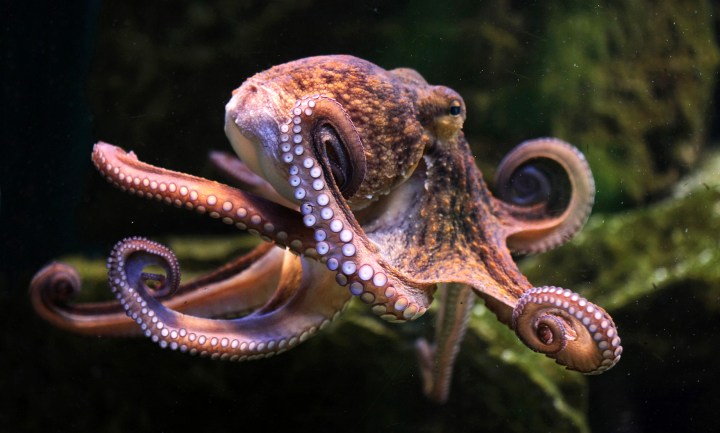
The problem facing octopi is increasing demand, high prices and limited supply. Most of the world’s fisheries, like Mauritania’s, are overexploited.
Tokyo’s 37 million people bustle in clean order. Trains run strictly according to schedule, people are considerate and there’s no rubbish blighting pavement or road. Smoking is banned on the street but not in all izakayas, laid-back neighbourhood establishments where the drinks are reasonably priced and the patrons welcoming.
Red lanterns mark an izakaya from the outside. An izakaya is not a big place – 20 or so is a crowd. Sit down and watch as a serious chef prepares the joint’s specialities. Perhaps small skewers of pork cooked over charcoal. Maybe deep-fried octopus, dreamy tofu or lovingly marinated sushi.
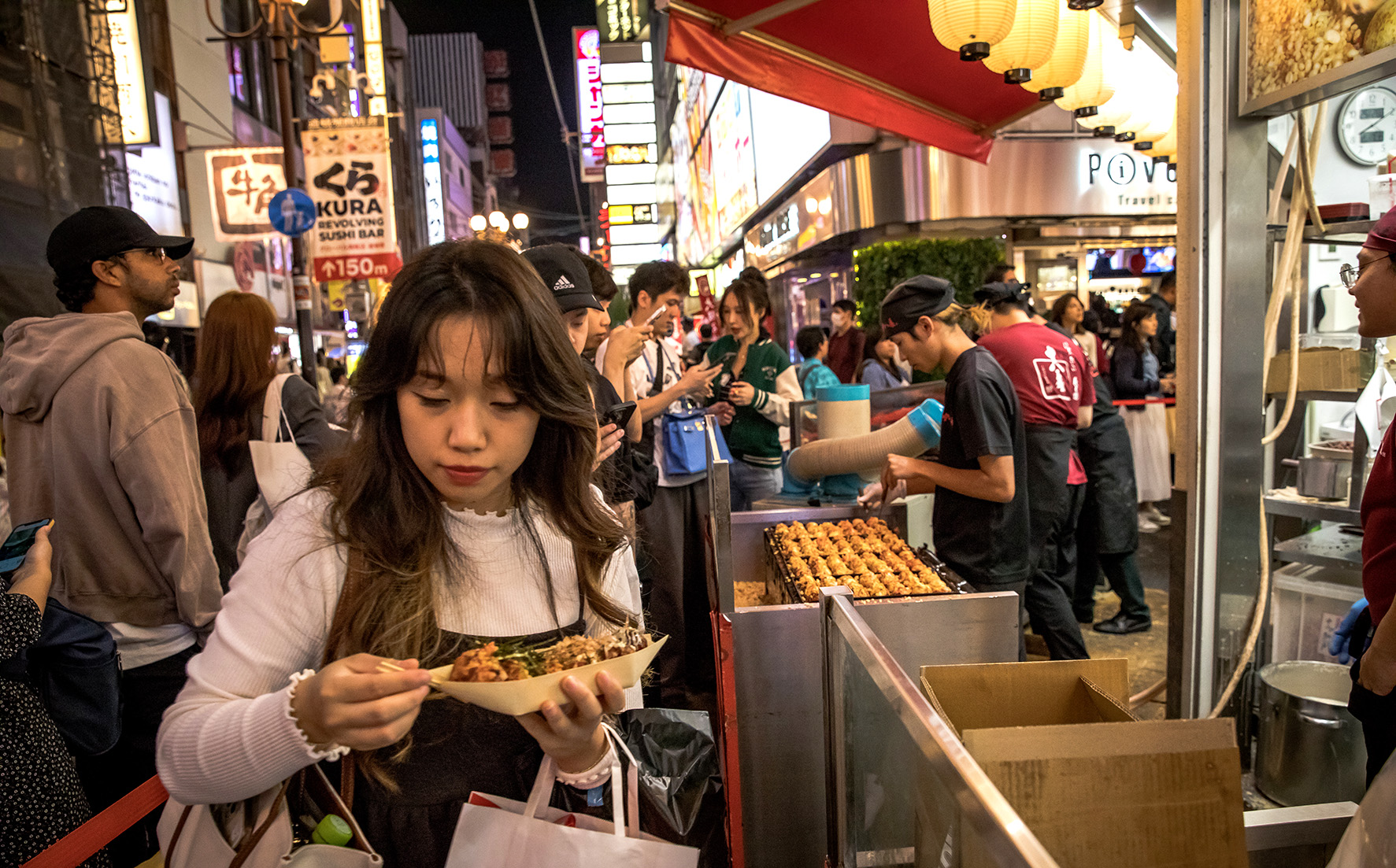
On a famous night market, people join crowds to eat Takoyaki, small pancake balls filled with octopus. (Photo: Nathalie Bertrams)
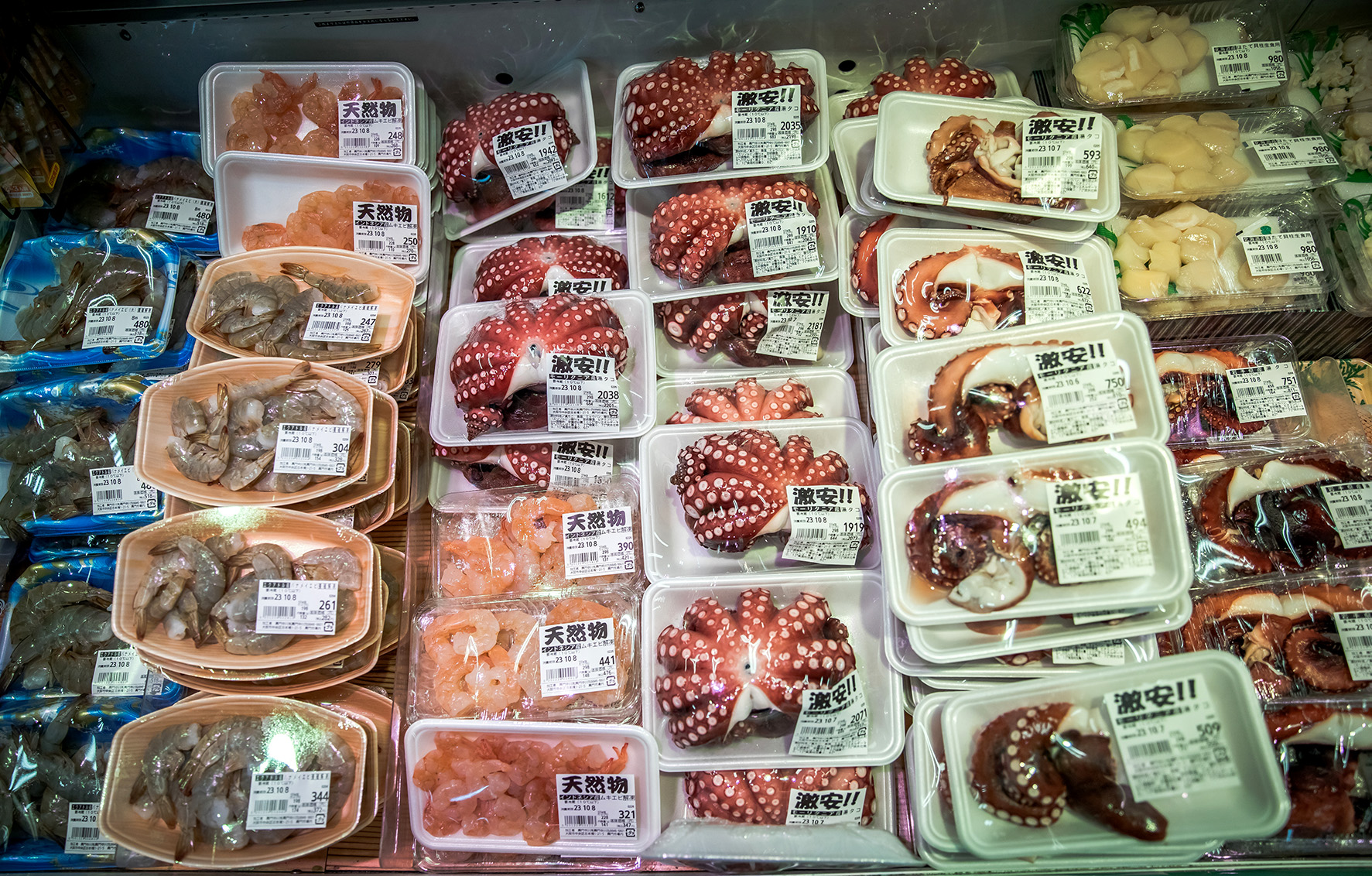
Mauritanian octopus on the Tokyo fish market. (Photo: Nathalie Bertrams)
Izakaya food is to die for – quite literally, for the common octopus.
According to the UN’s Food and Agriculture Organization (FAO), Mauritanian octopus accounted for 38% of Japan’s total importation of 10,434 tonnes of octopus in the first quarter of 2023.
Octopus is consumed throughout Japan, as sashimi, for example, but it is in Osaka where the delicacy really takes off. Along crowded nighttime neon thoroughfares, busy restaurant stalls cook takoyaki and people queue. Young and old, families, men, women, locals and tourists all want some of Osaka’s arguably quintessential street food.
Invented in 1935 and cooked in special trays, takoyaki is a round ball of spiced egg batter with a small piece of octopus inside. Fish flakes, mayonnaise and a special takoyaki sauce are put on the top. Eight takoyaki balls cost around 600 yen (R75).
Fishermen and exporters in Mauritania call the highest standard of caught octopus “Japan quality”. The per kilogram export price of Octopus vulgaris, also known as the common octopus, in Mauritania is benchmarked at what the Japanese will buy at.
In Nouadhibou, the coastal city at the centre of the country’s octopus fishery, people don’t use the French or Arabic word for octopus; they use the Japanese one – tako.
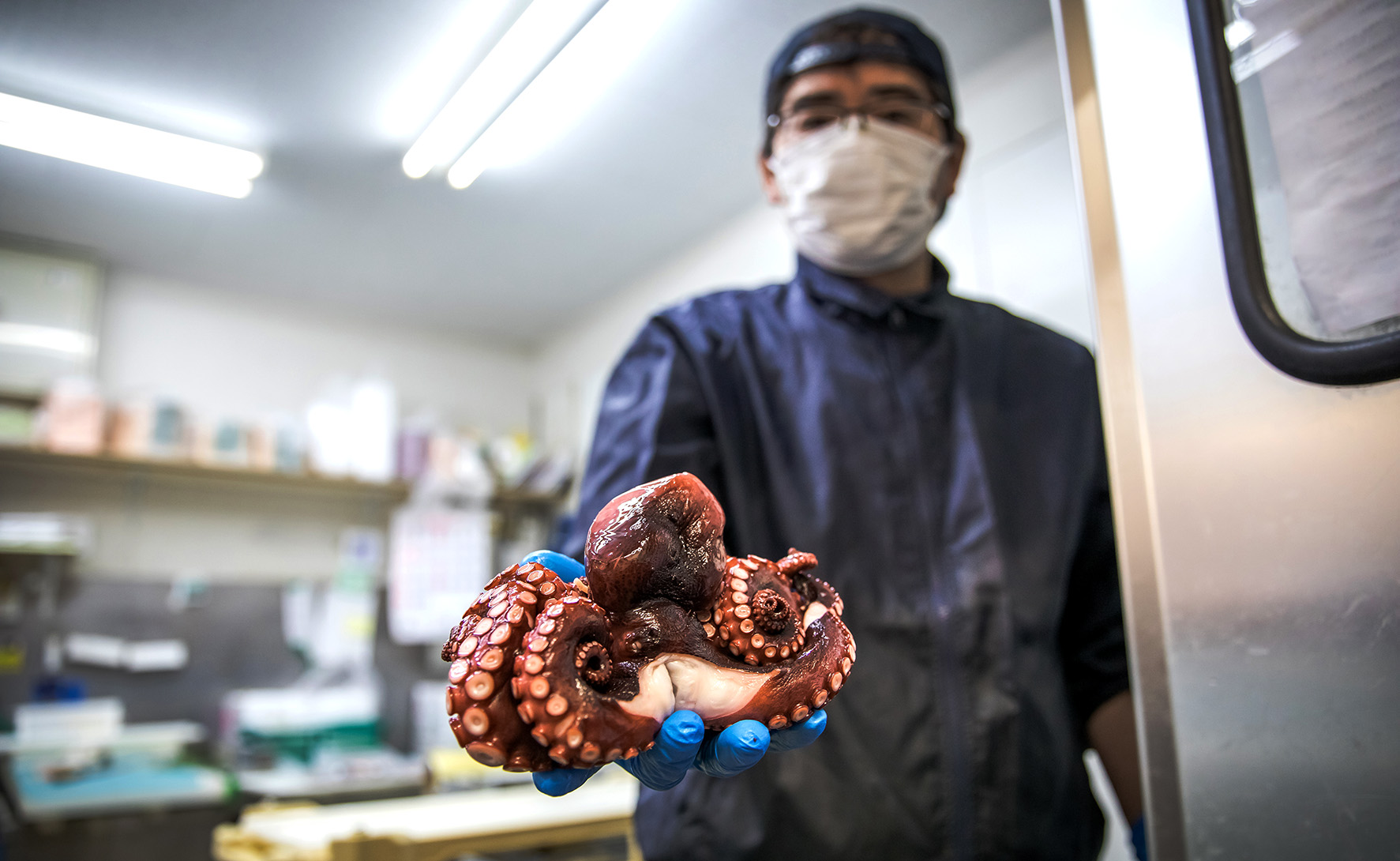
Mauritanian octopus in the Akidai supermarket, Tokyo. (Photo: Nathalie Bertrams)
Hiromichi Akiba owns the famous Akidai Supermarket in Tokyo. The fruits and vegetables in the market’s displays look perfect, not a blemish to be seen. Akiba is full of energy and seems to enjoy crying out to shoppers the virtues of his wares. As he stands next to a display of chilled Mauritanian octopus, two tentacles per packet, he says “Mauritanian octopus are very popular in Japan, partly because of their colour, similar to Japanese ones”.
Japanese consumers have a strong sense of aesthetics. Octopus importers won’t buy, for example, octopus with seven legs. Exporters at the Mauritanian port of Nouadhibou have someone smell each and every octopus that comes off the boat during the fishing season.
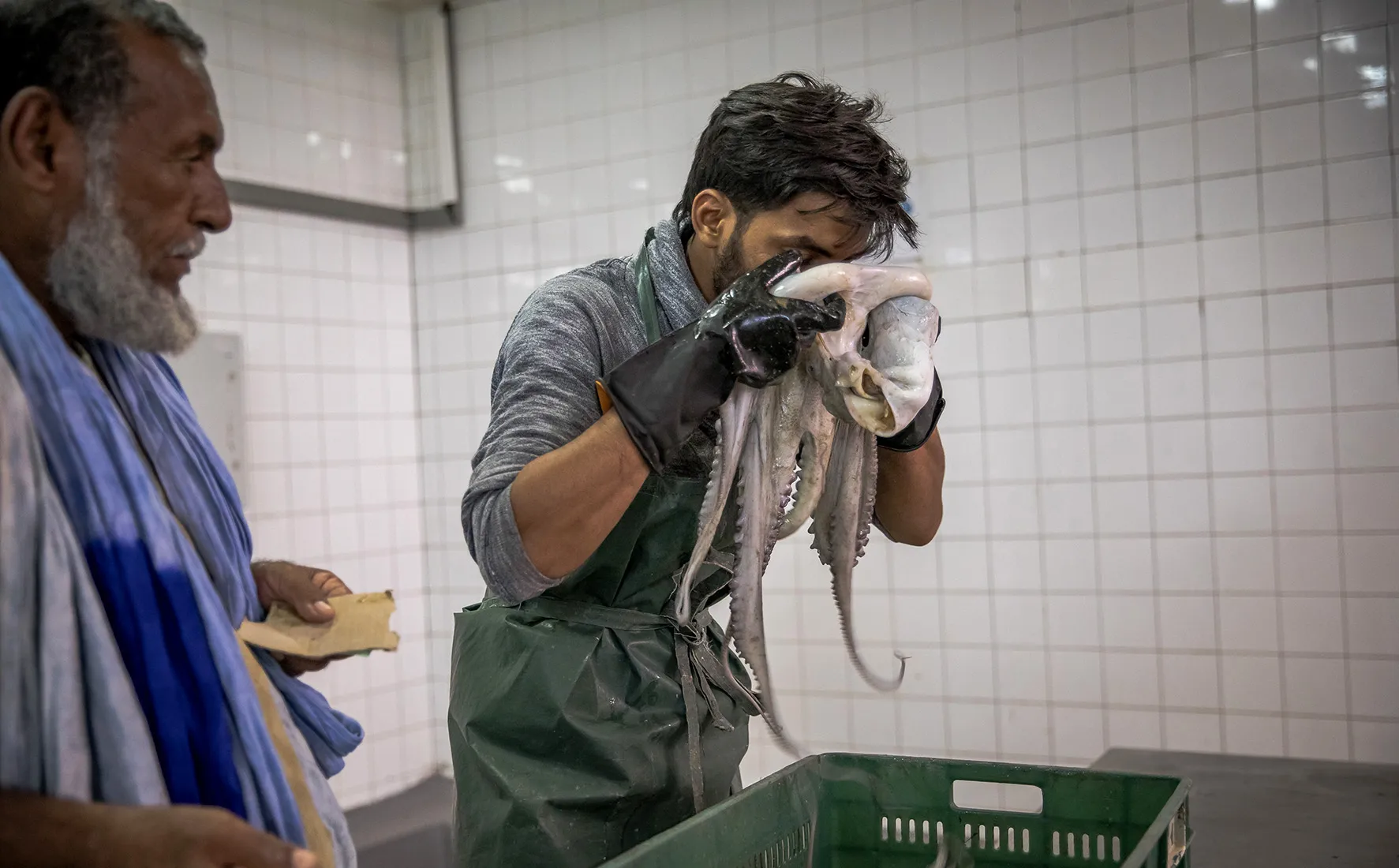
The rigid quality control includes smelling to see if any petrol from the pirogue has spilt, which would render the whole load useless. (Photo: Nathalie Bertrams)
Mr Lee, the owner of the Mauritanian & South Korean company BS Frigio, explains that if even one octopus in a shipment smells bad, say of petrol from an outboard motor, his Japanese client, Kanematsu Corp, will reject the entire consignment. Kanematsu buys 390 tonnes of cephalopods – $12.3-million worth – from Mauritania a year.
Lee is one of the estimated 100,000 people in Nouadhibou who depend on Mauritania’s over-exploited octopus fishery for a living. Nouadhibou has an estimated population of 140,000 and the country, a bit over four million.
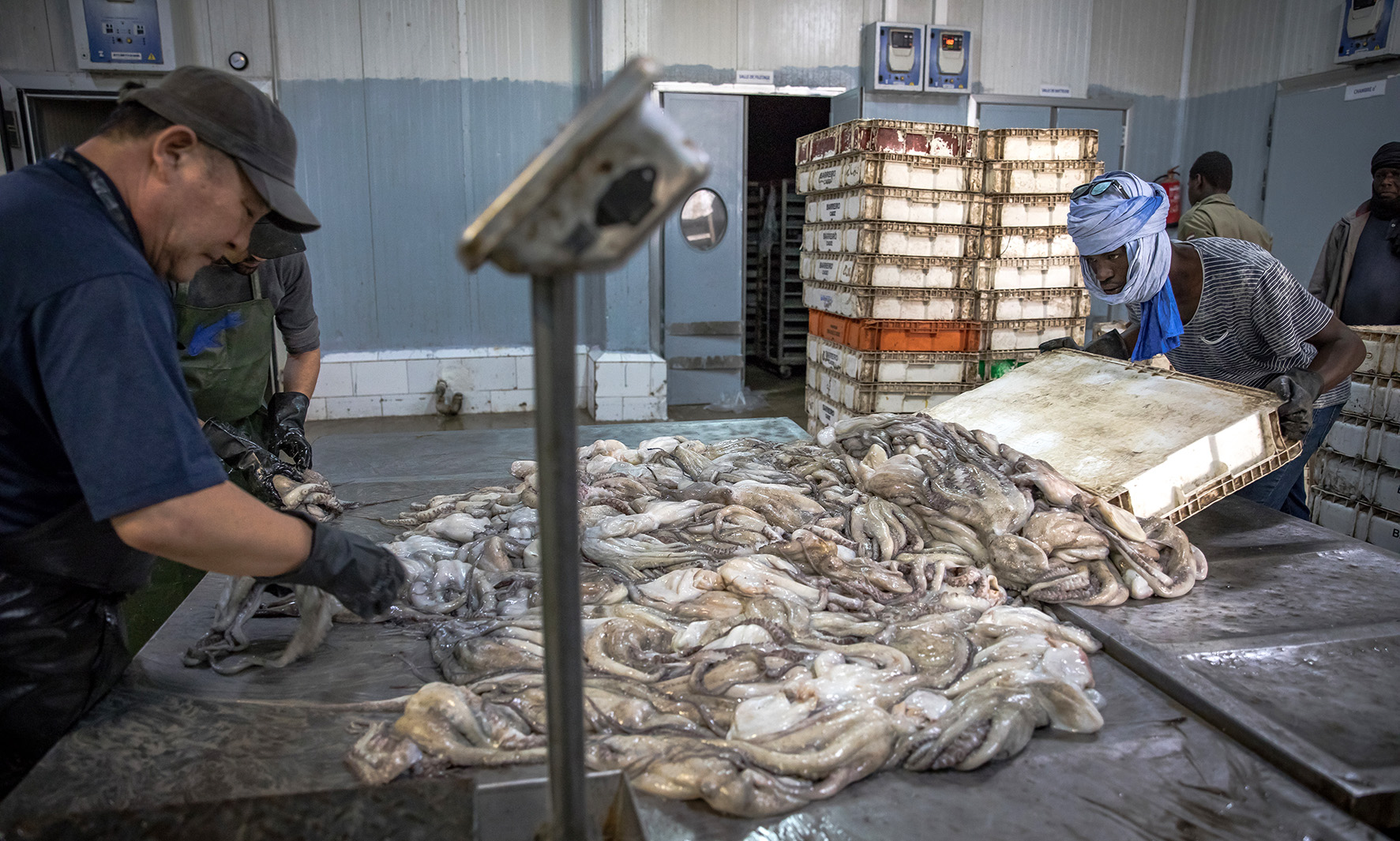
Mr Lee is a Korean octopus exporter, selling to Japan and Spain. He sorts the cephalopods by quality himself. (Photo: Nathalie Bertrams)
Octopus fishing is an important part of Mauritania’s economy – the 2021 export value was $312.7-million.
Solitary intelligence
The common octopus is a fast-growing and short-lived (one to two years) cephalopod, ranging from South Africa to England, and inhabits coastal environments up to a depth of 250m but usually around 100m. They are solitary predators who eat crustaceans, molluscs and fish. Their bite is poisonous. Chromatophores in their skin allow them to change colour and blend in with their environment.
While adults can weigh up to nine kilograms, the average is between four to five, and a female can produce up to half a million eggs. Once she has laid the eggs, the female will watch over the den for the next five months until they hatch, very rarely leaving it even for a moment. Eventually, she will starve to death and the planktonic hatchlings will drift in the ocean for the next 22 to 25 days, after which they settle to the seabed as juveniles. Few survive to be adults. Male octopi also die after mating.
Unlike social creatures, such as lions, who teach their offspring how to survive, each octopus has to learn alone and from scratch. They are, however, incredibly smart and the common octopus is probably the most intelligent species of the genus. Of the creature’s 500 million neurons, two-thirds are in its eight arms. They use tools and can solve complex puzzles. They dream.
The oldest known ancestor, based on a fossil found in the US, lived 330 million years ago. An evolutionary history older than the dinosaurs. Of the alien-looking octopus, Dr Sydney Bremer, a Nobel laureate, states that they are “the first intelligent beings on the planet.”
Because of their sentience and solitary nature, no one has yet been able to farm octopus. Simply put, octopi do not exist well in proximity to each other. When aquaculture attempts have been made, the creatures have shown high levels of stress and have at times engaged in cannibalism.
Keri Tietge, an octopus expert at the Brussels-based animal welfare organisation Eurogroup for Animals, explains that “to make [farming] profitable, they need to have high stocking density. So once these animals are in a small space, that’s one issue for their welfare, they also are in completely artificial barren tanks. So these really intelligent animals have no stimuli. So that’s why sometimes they do turn to aggression. They’re stressed, they’re bored.”
Scientists Eric Edsinger and Gül Dölen did find, however, publishing in Current Biology in 2018, that you can make octopi friendlier to each other temporarily if you dose them with MDMA, also known as ecstasy. Still, hardly a viable aquaculture technique.
A Spanish company, Nueva Pescanova, was the latest company to attempt to farm octopi and aimed to harvest 3,000 tons annually, roughly about one million individuals.
Nueva Pescanova filed for bankruptcy this year and is currently embroiled in a substantial labour dispute. The company refused to allow Daily Maverick to visit their research facility or even grant an interview. To date, Nueva Pescanova has managed to farm zero tonnes. Animal rights activists are fiercely opposing the company’s bid for environmental authorisations.
So, for now at least, the global production of octopus – the latest figures (2021) from the FAO put it at almost 375,000 tonnes – will continue to be met through fishing alone. In 2021, the Mauritanian fishery exported 25,188 tonnes.
Hassen Yehdih, a fisherman at Nouadhibou in Mauritania and father of five, says that when he manages to find an octopus, the average size is 1.5kg. So on that anecdotal basis, and roughly speaking, somewhere around 16.7 million octopi come out of Mauritanian waters a year.
While determining the exact number of octopi killed is a bit like asking how long is a piece of string, official figures are only given in tonnes, and the minimum legal catch in Mauritania is 500 grammes, there is no doubt that millions upon millions of common octopus are caught and end up in the stomachs of Japanese, American and South Korean consumers.
And Europeans. The Spanish, in particular.
Olive oil, salt, paprika and sliced boiled tentacle
According to a European Market Observatory for Fisheries and Aquaculture Products report published earlier this year, 80% of the EU’s €972-million worth of octopus imports in 2021 came from Morocco, Mauritania and Senegal.
As the third-largest octopus importer in the world, Spain acts as a hub for the EU’s trade. Two-thirds of the EU’s imports go through the country. Apart from re-exporting to EU countries and America, the Spanish also eat a lot of octopus. About 1.3kg per person annually.
The home of octopus cuisine in Spain is the province of Galicia, located on the top north-west of the country, and in particular the town of O Carballiño, population roughly 14,000. A huge statue of an octopus dominates the town’s main roundabout.
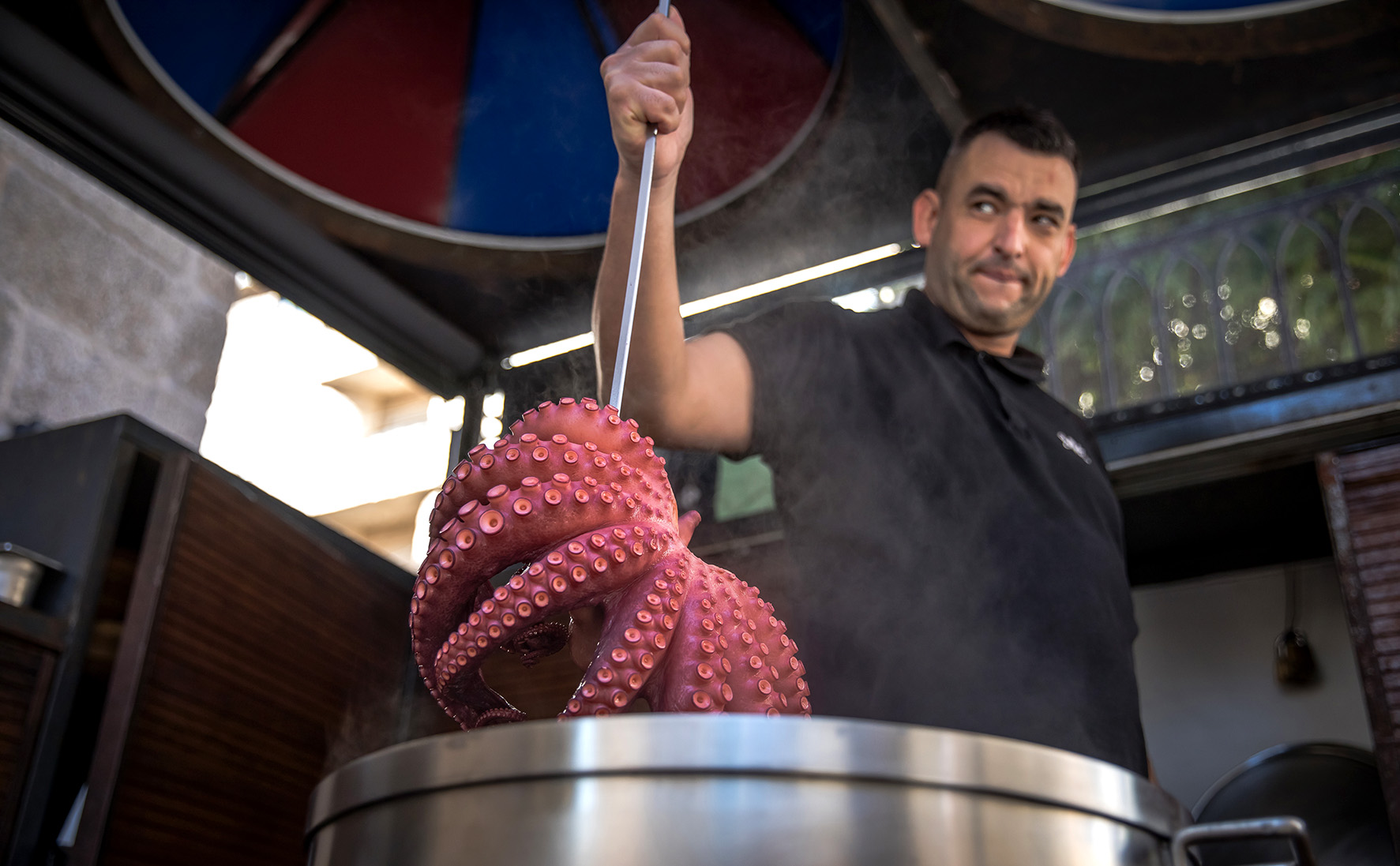
A pulpeiro in O Carballiño, Galicia, cooking the traditional ‘pulpo a feira’. (Photo: Nathalie Bertrams)
Marta Barros is the manager of Restaurante Casa Gazpara, a popular upmarket octopus restaurant. Her phone rings constantly as we talk at an outside table. Next to us, a cook pulls a whole Mauritanian octopus out of a boiling copper cauldron. People take photographs and ask when the restaurant opens.
For the last 61 years there’s been an octopus festival, La Festa do Pulpo de O Carballiño, in August. Barros says that “between 80,000 and 100,000 people eat octopus” and that “it is a very important” part of the region’s culture.
For her, the pleasure is seeing the reaction of serving octopus to people, giving them what they like.
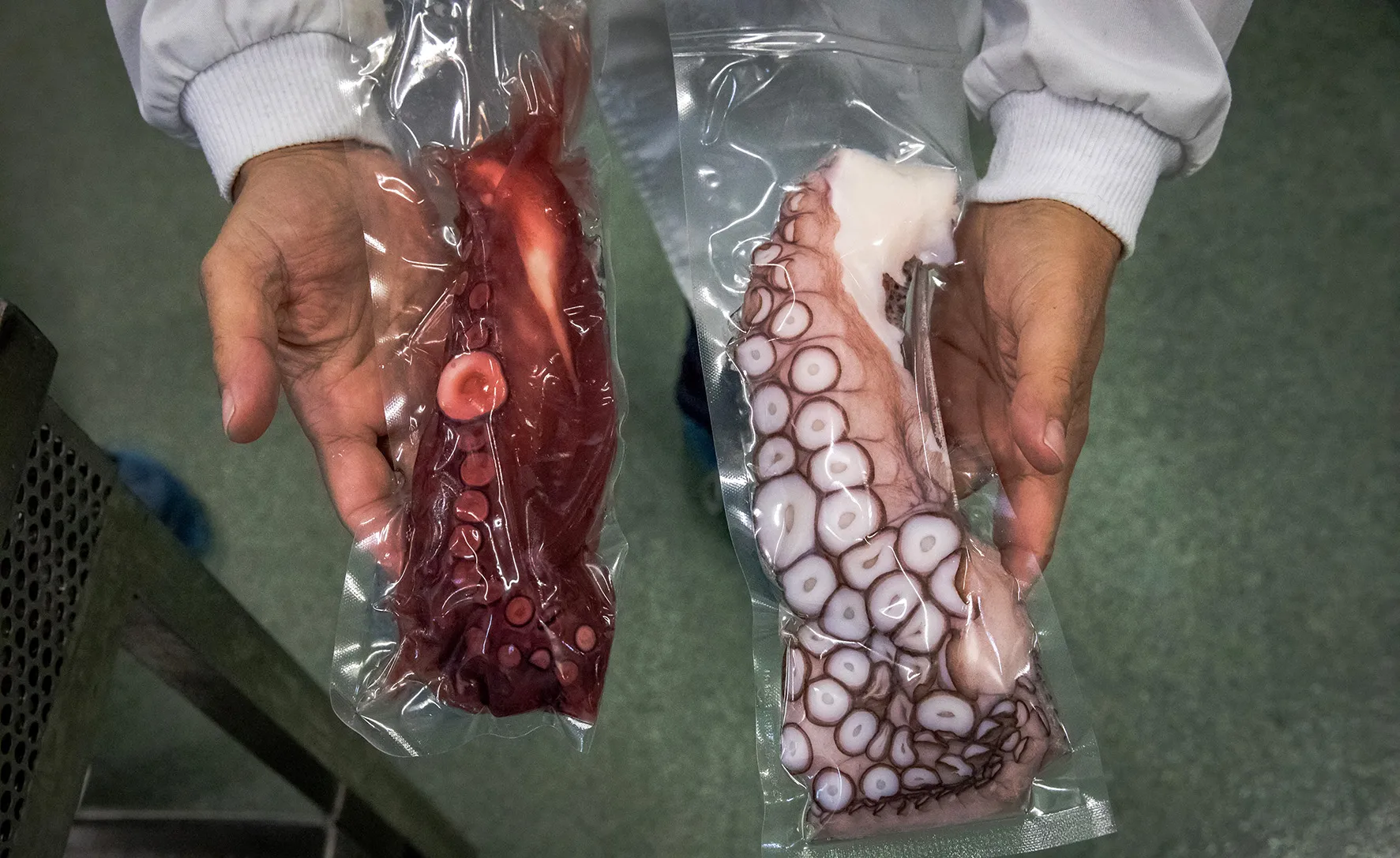
When the octopus is cooked, it turns characteristically red. (Photo: Nathalie Bertrams)
O Carballiño is 120km from the coast and only became the culinary home of octopus because of taxation. In the 16th century, monks at the Santa María de Oseira monastery, close to O Carballiño, accepted payment from sharecroppers in octopus. The monks did so well out of the arrangement that they started selling the octopus and teaching local women how to cook it.
The octopus trade remains a profitable business in Galicia and Daniel Atanes’ family has been in it for four generations. Atanes owns A Pulpeira, a successful company that imports, processes and exports common octopi. The company sells to clients in Spain, other European countries, America, Australia and Japan. He’s proud of his family’s history and Galician gastronomy.
Of Mauritania and neighbouring Western Sahara, he says, “That’s where the Japanese quality comes from, which we only use.”
Like in Mauritania, the best standard of octopus is known as “Japan quality” within the Spanish industry. Landings of octopi are way down in Galicia, decreasing from 4,100 tonnes in 2010 to 2,100 in 2019. The catch peaked at 16,000 tonnes in 1968.
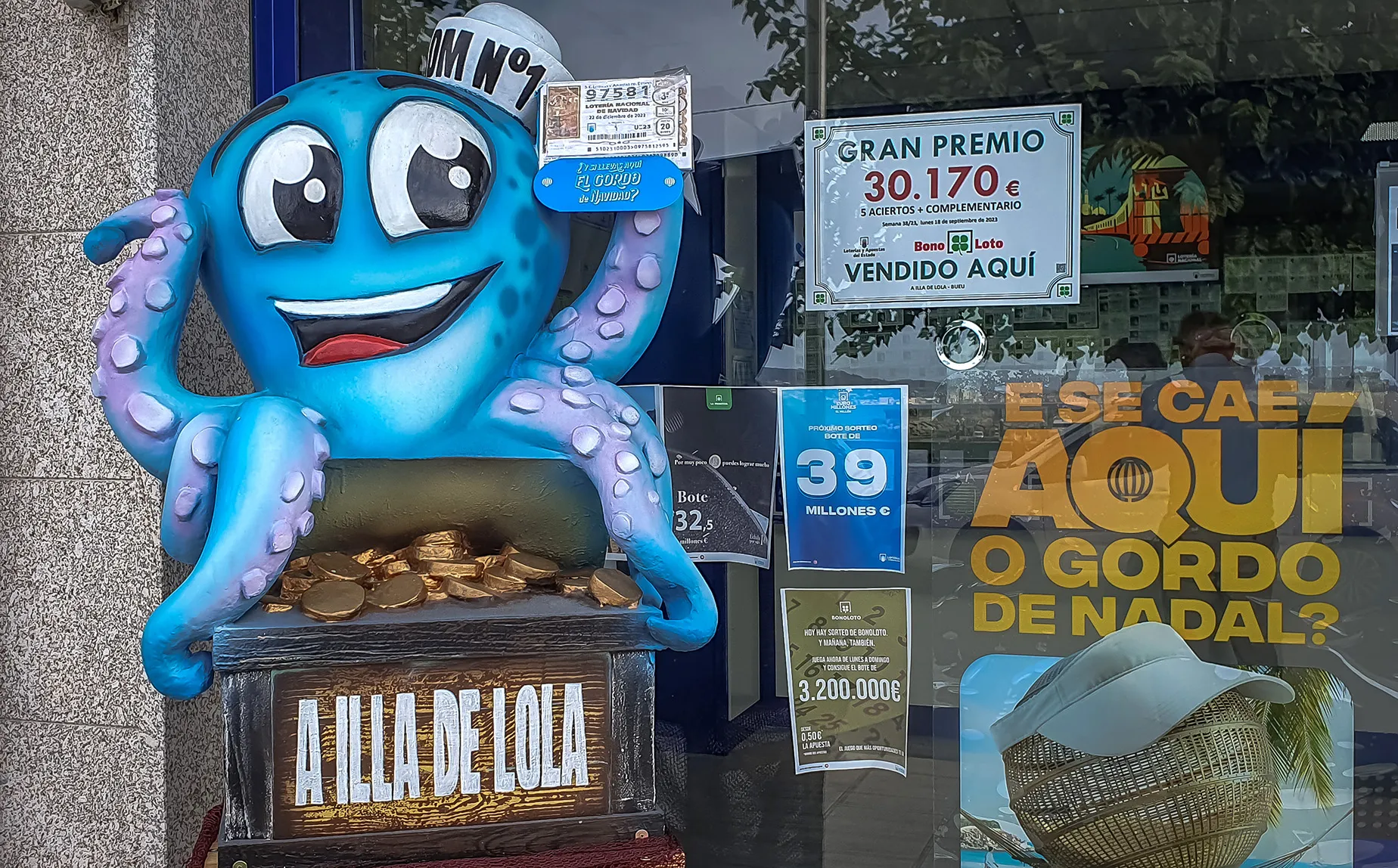
Galicia has a heritage of eating octopus that stretches back to the 16th century. Pulpo a feira is the favourite dish of the region. (Photo: Nathalie Bertrams)
A Pulpeira is located on the outskirts of O Carballiño in a light industrial zone. From the outside, it looks like a nondescript warehouse; it could be holding car parts or archiving corporate tax records. But inside, it’s a different story. There’s a slaughterhouse.
Past a bog standard front office, some desks and office workers looking to get home at the end of the day is the factory, and beyond that, there’s an actual warehouse. When Daily Maverick visited, it held 300 tons of octopus from Mauritania and Western Sahara. The company imports 800 tons a year and employs, depending on the season, between 40 to 50 people.
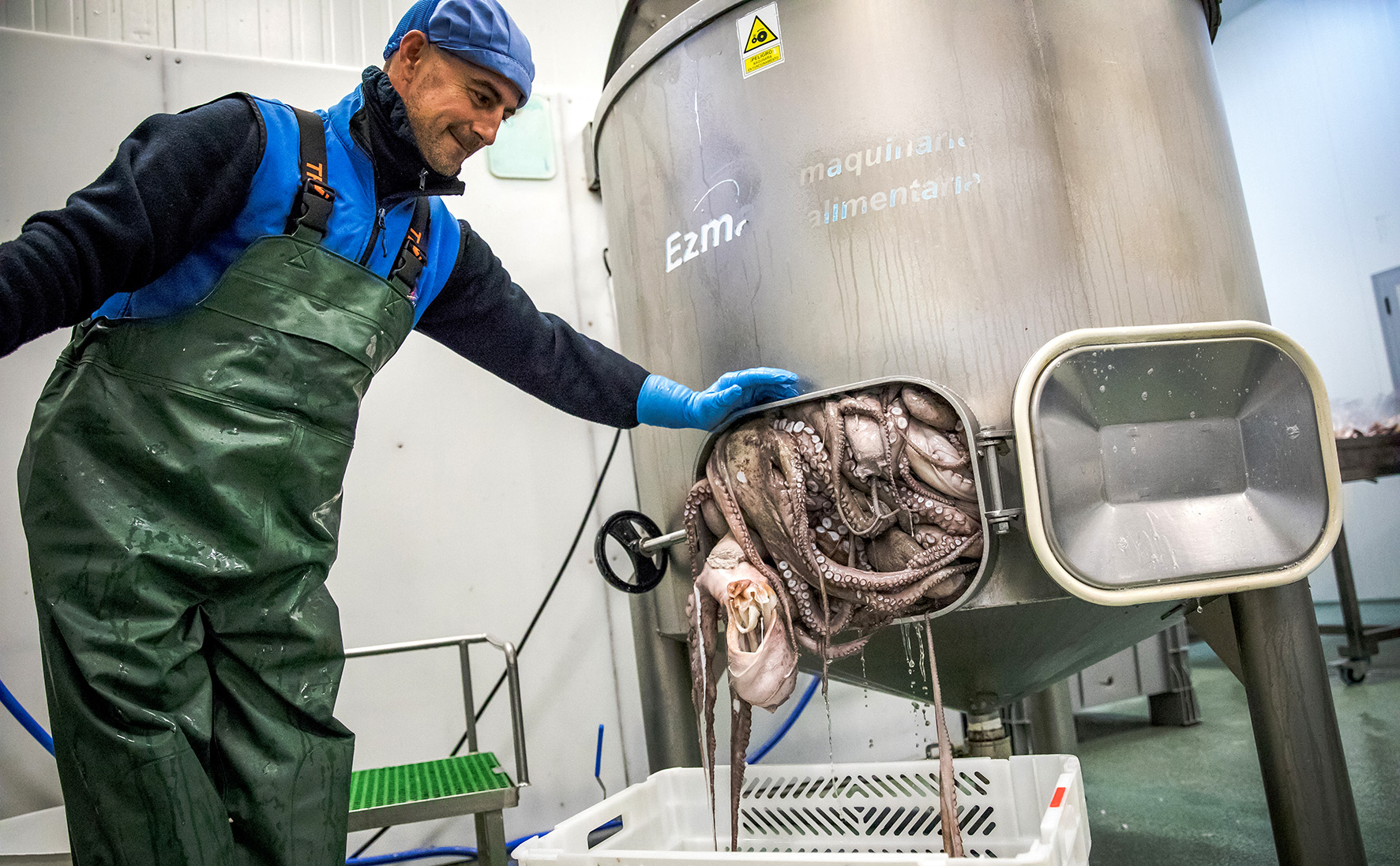
In a Spanish factory, a Mauritanian octopus is prepared for cooking. The head is cut off (and sold separately for seafood mixes), then the arms are carefully cut. (Photo: Nathalie Bertrams)
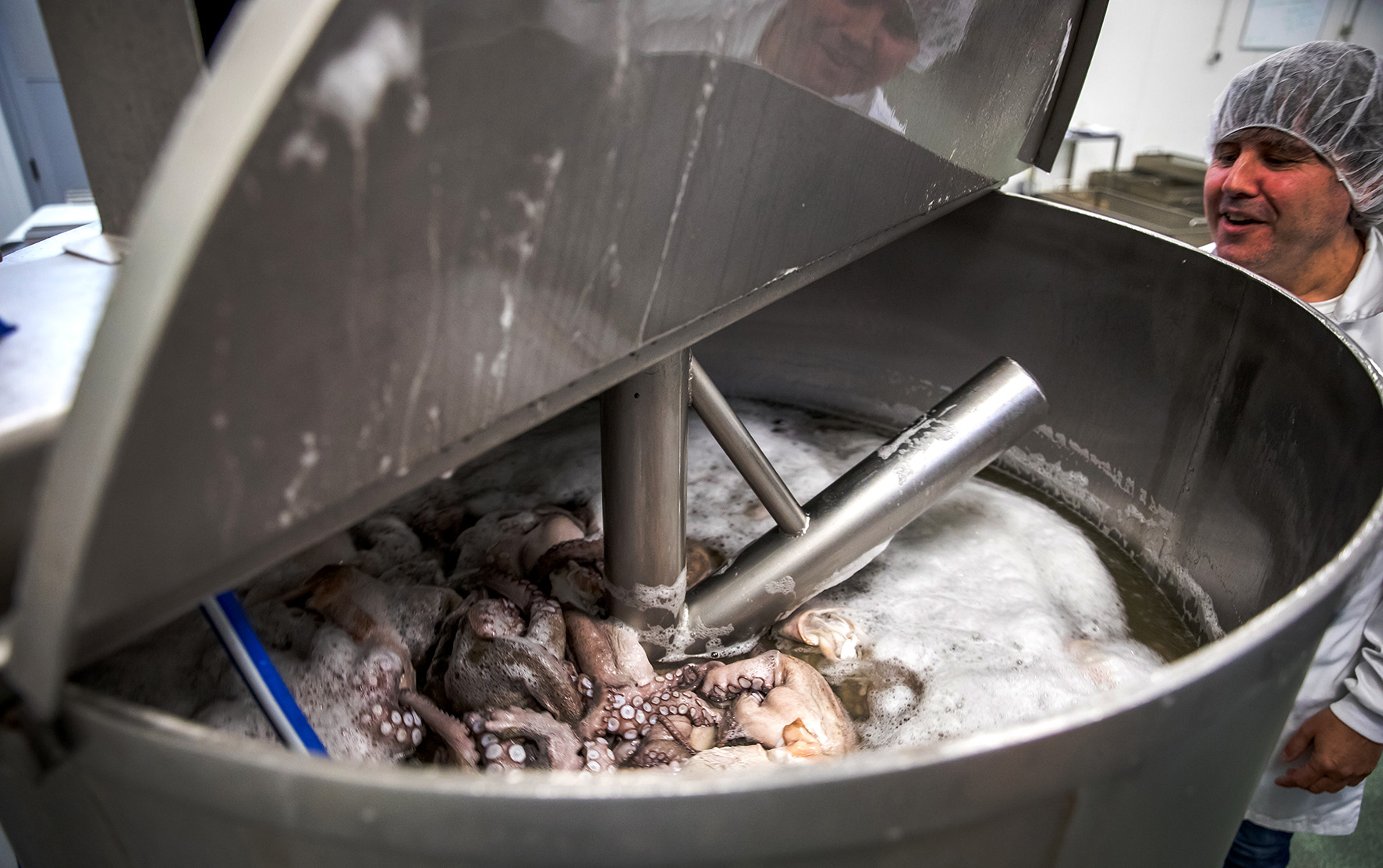
In the Spanish factory Frigorificos Arcos, Mauritanian octopus is prepared for cooking. First, it is washed and tenderised. (Photo: Nathalie Bertrams)
The cooking process starts with defrosting blocks of frozen octopi. Once thawed, the octopi are put into what looks like a gigantic stainless steel top-loading washing machine. Why? Because it is. Once the octopi are washed, one of the workers opens a hatch at the bottom of the machine. It seems to take forever for the last one to slip out.
Two ladies cut off heads and separate arms. Over and over again, as a pungently sweet smell permeates the chilled air. The arms are vacuum-packed and transferred to what are in effect pressure cookers. Atanes didn’t want Daily Maverick to photograph the cookers’ computer screens – the exact temperature and pressure is a trade secret – but the grey and somewhat slimy octopi are transformed into an appeasing red, cooking in their juices.
The global popularity of Hawaiian poke and Spanish-style tapas cuisine has, according to the FAO, increased demand for octopus. Tako poke is a classic Hawaiian dish consisting of sliced cooked octopus marinated with chilli flakes, sesame oil and seeds, green onions and soy sauce. Eaten cold. Variants abound.
What happens to the heads of the octopi? Atanes sends those to another Spanish company that cuts them up and adds them to packets of frozen seafood mix.
Three years ago, market consultancy firm Renub Research estimated that demand for all octopus species in 2025 would increase to 625,000 tonnes, 1.6 times current production. But there is no indication that such an increase is possible. With demand high and supply constrained, prices will rise. For example, Mauritania exported 31,102 tonnes in 2020 worth $228.6-million and in 2021 exported 5,914 tonnes less, but the value was $84.1-million more.
Hiromichi Akiba has seen the price of octopus rise considerably: it used to be ¥1000 (R120) per kilo a few years ago, now it’s ¥4000. He says that in the “early days, it was very popular, cheap, something everyone could eat”.
Atanes is a friendly guy, a people person. Once the factory visit is over, he’s keen to show how octopus is eaten in O Carballiño. He heats a tentacle in the company’s microwave, not quite the traditional copper cauldron, but Atanes says it makes no difference to the taste. After chopping up the arm with scissors, he puts the slices on a wooden plate, drizzles olive oil and sprinkles on paprika and salt. Pulpo á feira, Galicia’s most famous dish.
Two pieces in and the wonderful flavour dissipates, leaving nothing but ash.
7,500 boats
In at least one important aspect, Mauritania’s octopus fishery is a success. Up until 2012, European, Japanese and Chinese boats, often destructively bottom-trawling, dominated the industry. Since then, the Mauritanian government has embarked upon a policy of indigenisation and today it is Mauritanian companies, boats and crews.
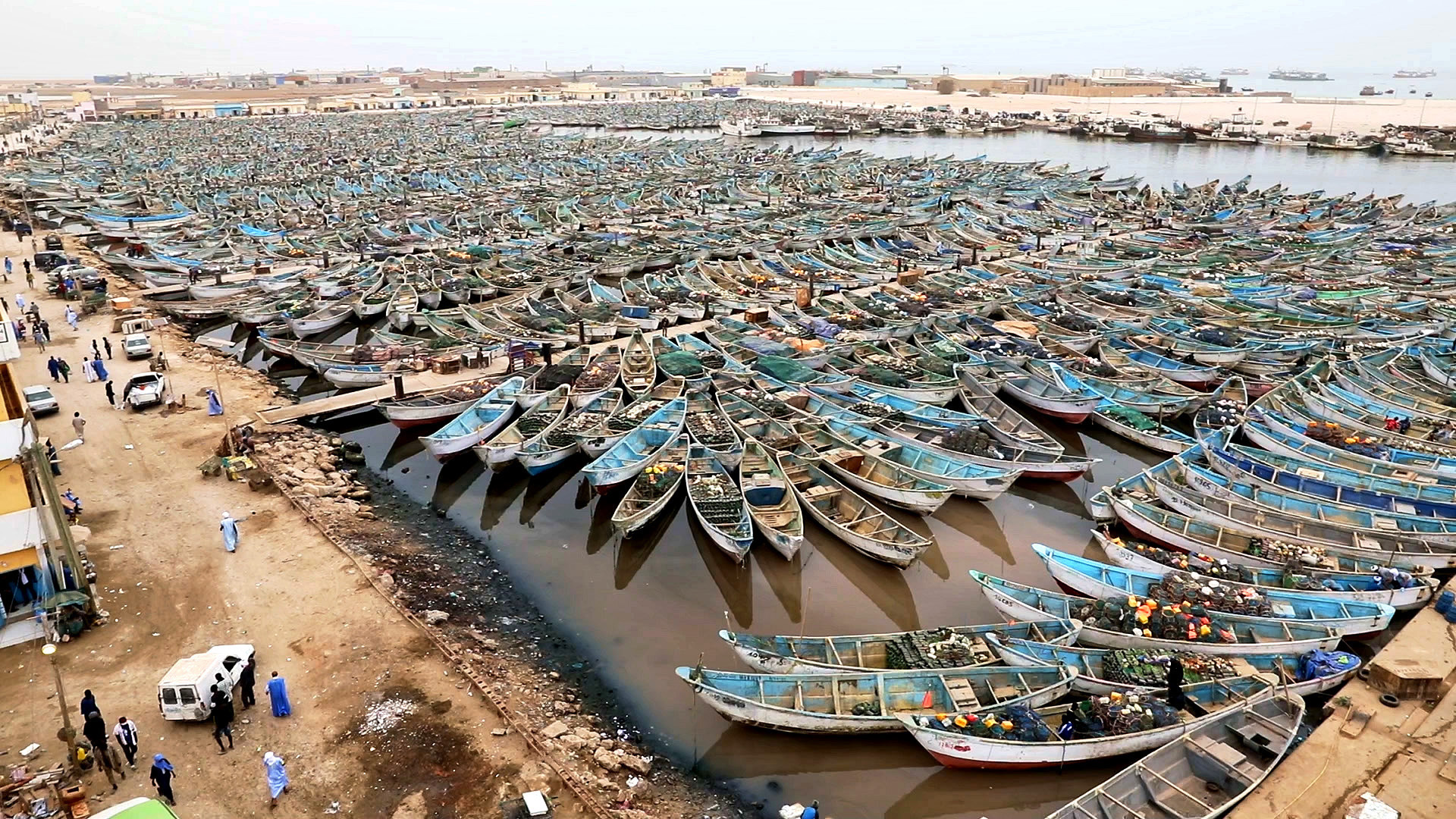
The artisinal fishing port of Nouadhibou, Mauritania with 5,000-7,500 octopus pirogues. Up to 50,000 men fish for octopus and in total, at least 100,000 people are working here. (Photo: Nathalie Bertrams)
Nouadhibou’s harbour is choked with pirogues, often painted blue and equipped with outboard motors. The shore is a slimy and foul-smelling mess of dead marine organisms rotting in the heat and humidity. Fishermen spend 15 to 20 days at sea, sometimes in perilous conditions. Other boats come to collect the catch so it remains fresh. There are local and foreign exporters, each freezing hundreds of tonnes.
Fifty thousand fishermen and 100,000 people are dependent upon the octopus fishery for their livelihoods. Unlike South Africa, and even though it is a poor country, Mauritania’s economic fundamentals have hope. GDP growth is at 2.4%, inequality is far lower than SA’s and its unemployment rate is an enviable 11%.
Yet there is a looming problem.
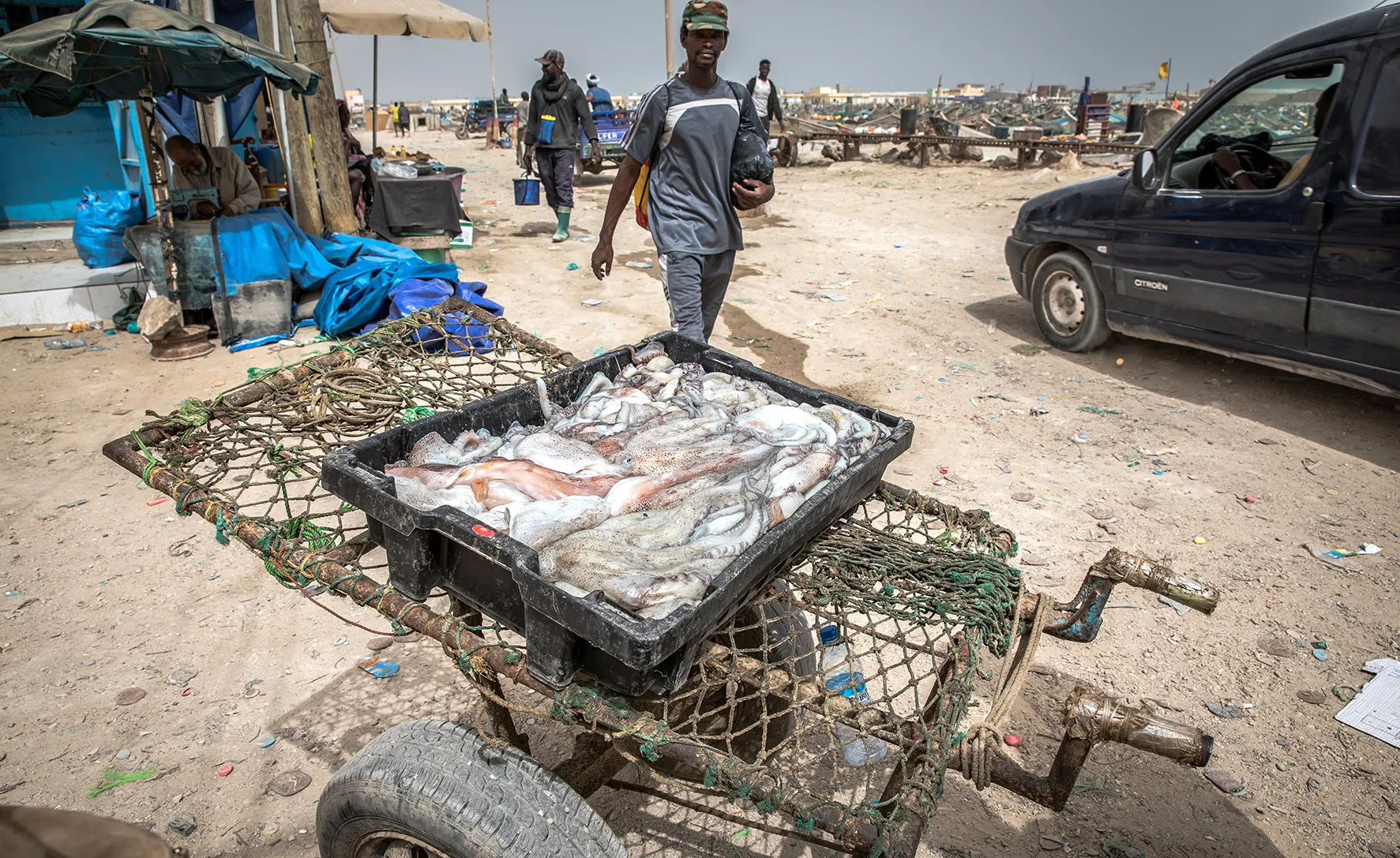
Freshly caught octopus is delivered to a small middleman in the harbour who then quickly transports it to a factory. (Photo: Nathalie Bertrams)
Dr Beyah Meissa is a marine biologist at the Mauritanian Institute for Oceanic Research and Fisheries, located opposite Nouadhibou’s harbour, and he’s worried.
Meissa points out that “there has been an increase in the number of boats fishing for octopus here because the price is also going up. And the fishermen – despite the fact that since 2016 the quota system, total allowable catch [TAC] has been in place – there have been transgressions… transgressions of the TAC.
“The TAC was proposed by research to ensure sustainability but was not respected too much by the fishermen. Meaning that they were catching much more than they should. And that, in a way, affects the state of the resource at the moment. In conclusion, the stock is effectively overexploited.”
The government is trying to limit the damage.
Fishing seasons are in place as are zones where fishing is forbidden. Mauritania has a coast guard. Still, the fishermen are constantly pressuring the government to keep the fishery open as life is hard on the 7,500 boats.
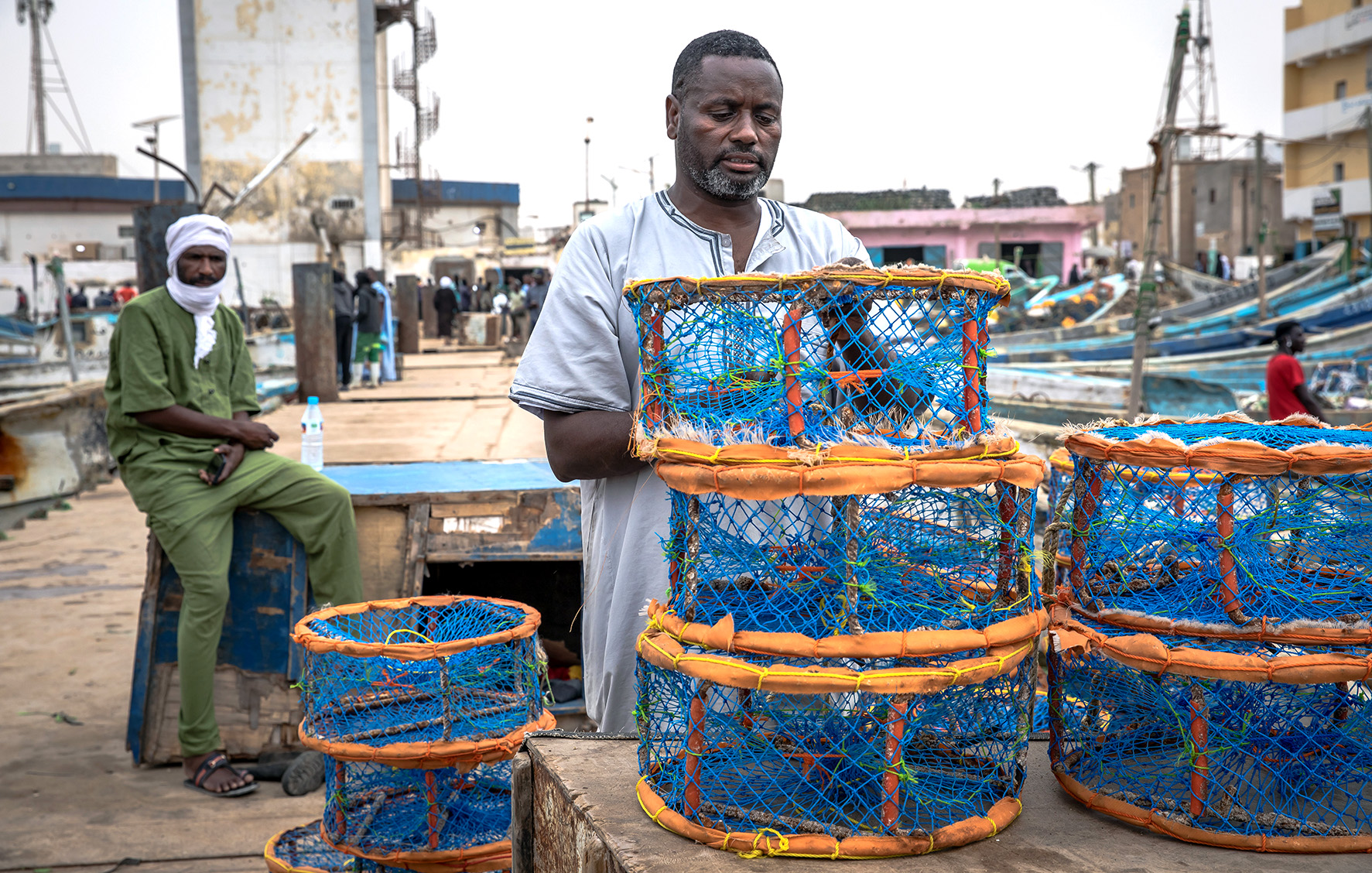
Atigh Boucavar (48), a fisherman in the harbour of Nouadhibou. He has been fishing since 1996 and uses a new trap that the Chinese introduced. (Photo: Nathalie Bertrams)
Atigh Boucavar, born in 1975, started fishing in 1996. Sometimes he catches octopus, sometimes not. He says “it is just a little bit of money that allows me to survive. It is so dangerous but I have no choice, I must go. Most of the workers don’t have boats, the businessmen own them, they fish for them.”
The five to seven fishermen per boat share the R100 per kilo profit.
Babana Yayha Emhamed is an inspector general at the Ministry of Fisheries and Maritime Economy. Daily Maverick spoke to him at a lonely petrol station between Nouadhibou and Nouakchott. Sweet mint tea is served. Goats in front and dunes all around. Mauritania is an arid country, three-quarters desert or semi-desert, and it’s close to the size of South Africa.
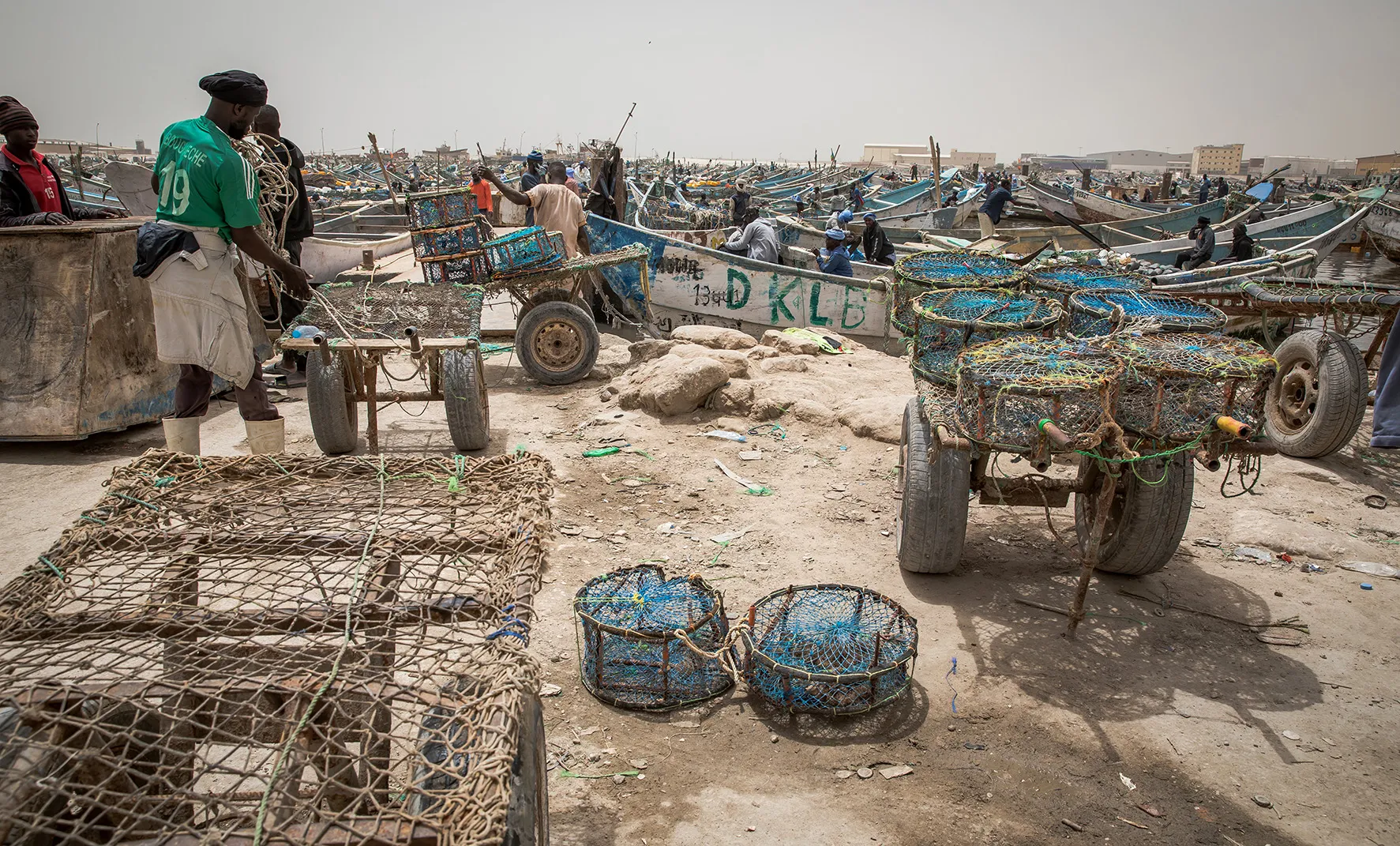
Octopus traps on the pier. (Photo: Nathalie Bertrams)
Emhamed is more than aware of the plight of people like Boucavar: “The fishermen are like those at sea who say that one fish eats another. It’s a chain. Here too, the men, each one eats the other.
“There’s the big importer who buys the product and tries to manipulate the Mauritanian producers [exporters]. The producers manipulate the collectors [middlemen] who manipulate the small-scale fishermen. Each is a slave to the other.”
Very few Mauritanians eat octopus, finding it gross. Goats, camels, sheep and cows are the thing. In fact, the octopus fishery only began in the 1970s – and all because of one Japanese man.
A small apartment in Tokyo
In pressed uniforms, grey-haired men use flashing batons to guide pedestrians around a tiny bit of road maintenance outside a nondescript 11-story apartment building. A child plays in a small park across the narrow road. There’s a golf driving range encased in nets three stories high. Edogawa City, an autonomous part of the Tokyo Metropolis, is a quiet area of family residencies.
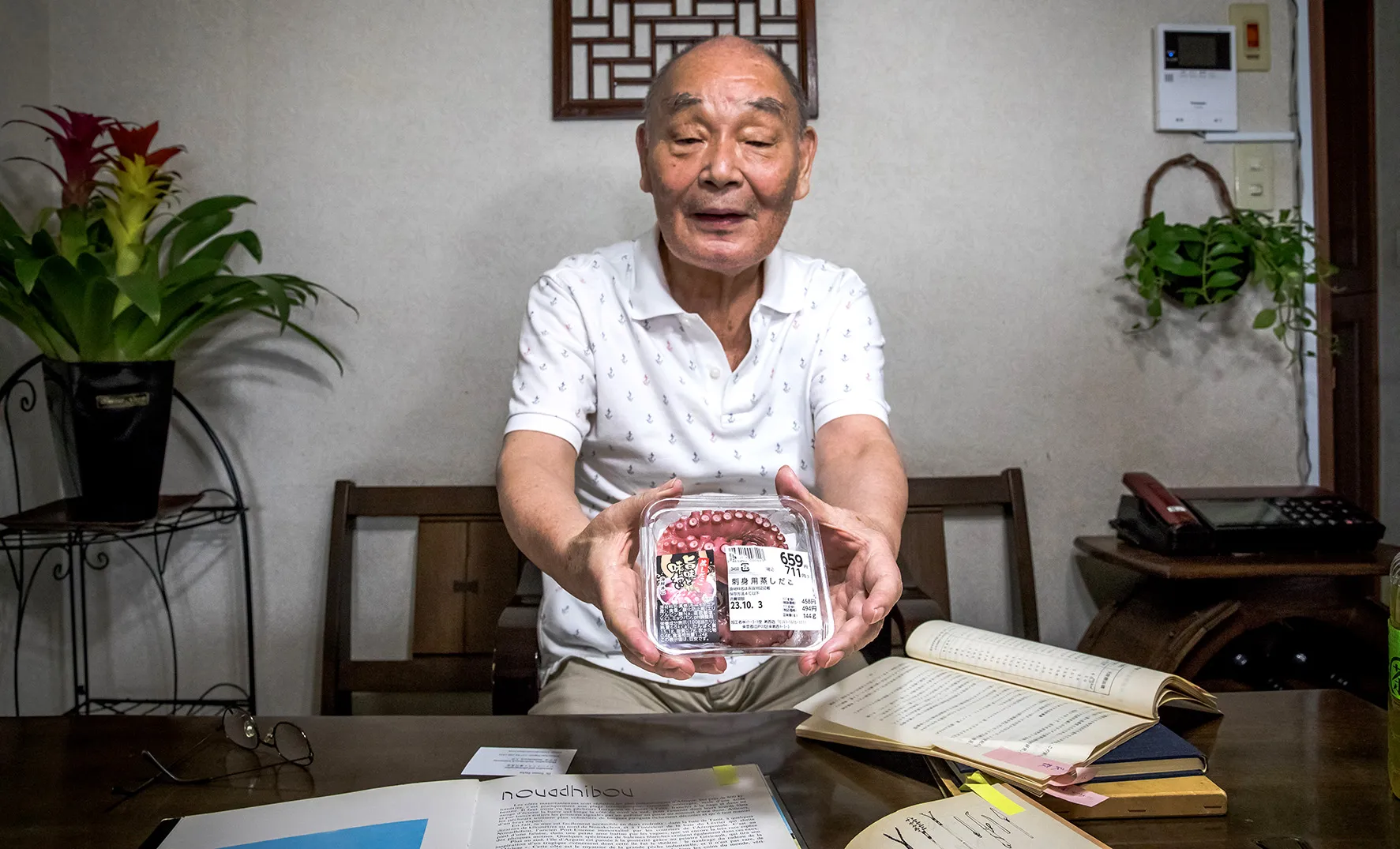
Dr Masaaki Nakamura, a fisheries scientist, came to Mauritania in the 1970s for the Japan International Cooperation Agency and developed the Mauritanian octopus fishing industry. He taught people how to fish with traditional pots as traps. From the initial 10 fishermen, their number is now as high as 50,000. (Photo: Nathalie Bertrams)
But not so quiet in Masaaki Nakamura’s small and spotless flat. The neighbours are renovating and the drilling is expected to stop in two months, after which, once he has completely recovered from his hip operation, Nakamura (73) will visit Nouadhibou again. He’s used to flying, having visited 120 countries.
On behalf of the Japan International Cooperation Agency, and armed with a doctorate in fisheries science, Nakamura first travelled to Mauritania in 1976. What Nakamura encountered then, looking at the possibility of developing a fishery, was that “there was nothing. Nothing but desert. I didn’t know what I should do.”
One of his first challenges was to find fishermen. According to papers from the US Embassy in Mauritania, there were just 1,800 artisanal fishermen in the entire country in 1981. Up until 1979, only foreign fleets – mostly Japanese, Spanish and Soviet – plied the waters. Nakamura started with 10 fishermen. He showed them Japan’s traditional method of using clay pots to catch octopi and worked on boat design. A Japanese company bought the catch.
Mauritanians still use pots, now plastic, because they aren’t destructive and are simple to operate: fix them every two metres along a 100m line, sink the pots to 30m or so, and haul them up the next day. Octopi go into the pot to hide but end up at the bottom of a boat.
Two droughts in the 1970s played a significant role in Mauritania’s development of the industry. Babana Emhamed says that “drought decimated all the livestock, because Mauritanians, by nature, were born with their backs to the sea. They are transhumant nomads… they know nothing of the sea.”
The consequence of the droughts was “a massive exodus of people to Nouakchott and Nouadhibou, and we had to find an alternative. That’s when we realised that we had a wealth of fisheries here, which could generate money and jobs for young people.”
Nakamura is adamant that the indigenisation process needs to go further. He says “China has a huge fleet of hundreds of trawlers off West Africa, and they are stealing all the resources.”
What seems to be happening, according to him, is that foreign vessels are catching octopus, either on purpose or as bycatch, and aren’t landing them at West African ports. The catch is being shipped directly to China.
Nakamura is something of a unionist, and not just because he used to work at the Japan Tuna Fisheries Co-operative Association. The Mauritanian fishermen’s associations were, according to him, crucial to the fishery’s successful development.
The military nature of Mauritania’s governments – six coups from 1978 to 2008 – meant that the civil service’s capacity, according to Nakamura, was low and direct engagement with local fishermen on seasons and forbidden zones was the correct approach. And that’s why he’s going to Nouadhibou again: to speak to the unions, who he thinks should own the exporting factories.
He is convinced that further indigenisation is Mauritania’s only chance and that the number of foreign trawlers has to be reduced. According to him, the time “to act is now” to ensure the fishery’s long-term viability.
Babana Emhamed points to another threat. An important food source for octopi in Mauritania is a sea snail, the Algarve volute. Until recently the snail had no real commercial value. Then the Chinese market opened up and now “a lot of effort is being put into this species”.
The overall problem facing octopi is increasing demand, high prices and limited supply. Most of the world’s fisheries, like Mauritania’s, are overexploited.
The common octopus’s future ultimately depends on how many people eat how much tako poke, pulpo á feira and takoyaki – gastronomy prevailing over 330 million years of solitary intelligence. DM
This story was supported by the Pulitzer Center and Fonds Bijzondere Journalistieke Projecten.























 Become an Insider
Become an Insider
Fascinating and insightful article. Thank you for this. Saddening to know that another species is overexploited due to high demand. I myself had Takoyaki when I was in Osaka and it is indeed delicious. I’m sort of glad however that octopus is not in such high demand in SA now.
Put ” My Octopus Teachers ” on a free to view channel and see if minds ars changed. All the seas around Africa are being fished out, looted, destroyed by foreign players. The collapse of fishing stock resulted in pirates off the Somalian coast. Perhaps pirates and poachers could be recruited to patrol and protect the seas? A satellite image of factory ships around SA’s coast will make your jaw drop: hundreds and nothing is done about it.